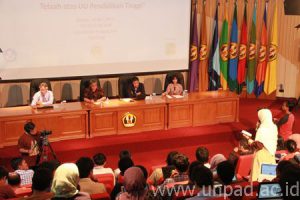[Unpad.ac.id, 14/05/2013] Law on Higher Education No. 12/2012 should never be considered as a trigger that causes price hike in higher education tuition rate. On the contrary, the law necessitates that operational costs be distributed to universities to help their running.

“I am deeply saddened with such view, accusing that increasing tuition rate is caused by the issuance of the law. The law, article 88, clearly states the government must allocate state budget to fund campus operational, which means that the community can now pay less,” said the Secretary of Directorate General of Higher Education, Dr. Ir. Patdono Suwignyo, M.Eng.Sc, when speaking at the public discussion on Campus Autonomy, Examining Law on Higher Education on Tuesday, (14/5) at Bale Sawala in Jatinangor.
Furthermore, according to Suwignyo, the government has allotted a budget in the amount of Rp. 2.7 billion for Campus Operational Costs (BOPTN). This year, the amount increases and totals Rp. 3.5 billion. “Operational funding that goes to elementary and high schools has enabled every individuals to have free education. BOPTN will clearly enable anyone to pursue their higher education without having to pay too much,” he added.
Law on Higher Education has recently brought forth people’s concern on the increasing rate of university tuition. It is argued that autonomy only means that the government has let its responsibility to provide quality education for the people go. Wildan Ghiffary, speaking in the event as student representative, said that the law will only lead to campus commercialization.
However, other speaker, professor from ITB, Prof. Dr. Ir. Satryo Soemantri Brodjonegoro, argued that “autonomy does not mean that the government leaves everything at the hand of the university. With or without autonomy, the government still holds responsibility to help fund the state universities.”



